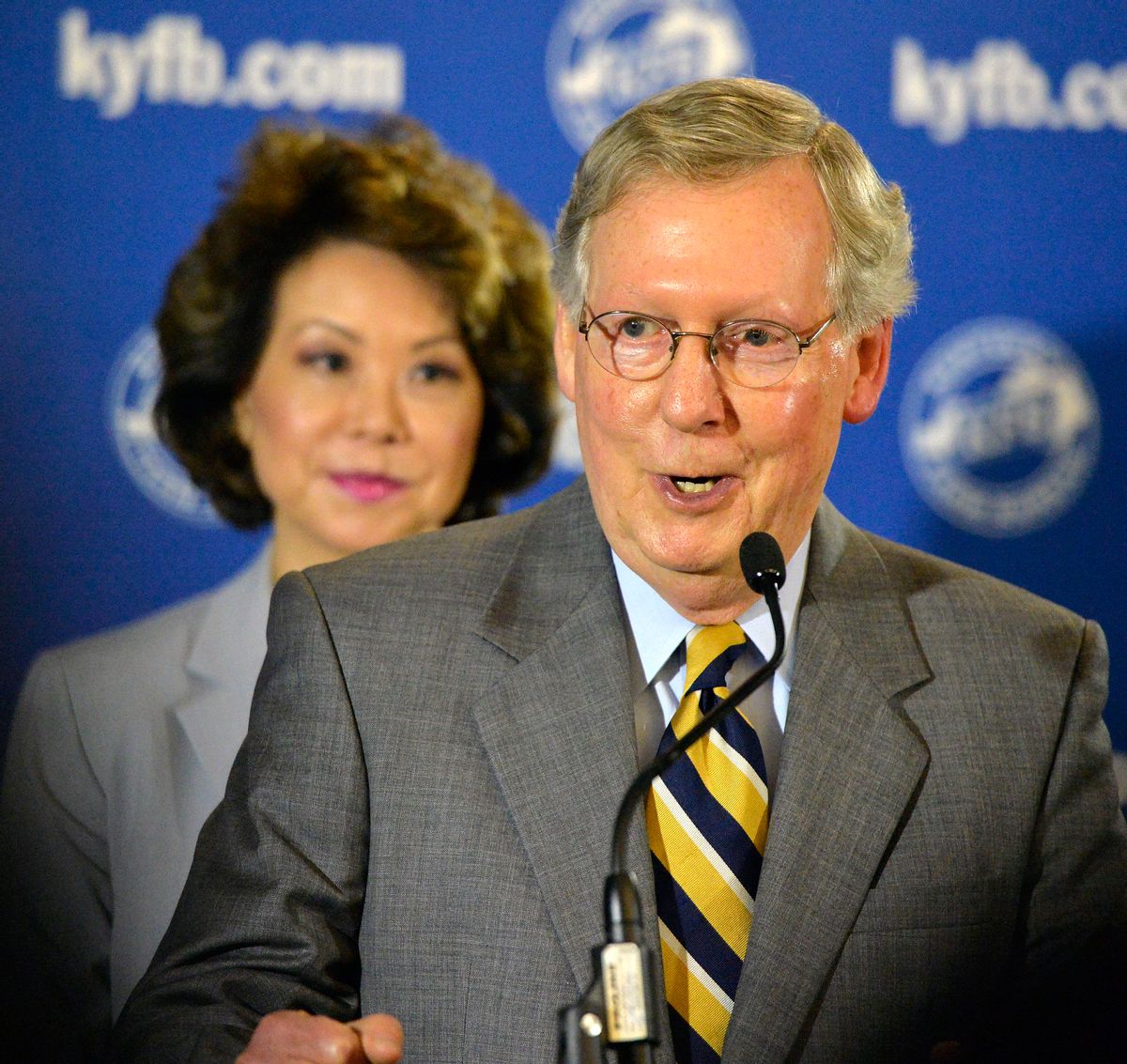ATLANTA (AP) — Who's to blame for Washington gridlock?
Candidates in the battle for control of the Senate agree: It's the other guy, the other guy's party and — especially — the other guy's party leaders.
But the finger-pointing is getting dicey, and not just for incumbents who have to defend the ways of Washington.
Newcomers are trying to campaign as outsiders without alienating, or being linked to, party leaders who may be helping them try to win an office on Capitol Hill.
So there's much rhetorical dancing and dubious spin as Republicans try to gain the six seats required to win the Senate majority and Democrats try to hang onto control.
Should the GOP succeed, their majority leader would be 30-year Senate veteran Mitch McConnell of Kentucky.
Central to fixing the partisan sniping and inaction, he says while campaigning, is "to put a Kentuckian in charge of the Senate" to stand in the way of President Barack Obama's agenda.
McConnell says his Democratic opponent, Alison Lundergan Grimes, is just a rubber stamp for Obama and the Senate's Democratic leader, Harry Reid of Nevada.
Thus, the "real candidate of change in this race," McConnell reasons, "is me."
Grimes, of course, scoffs at that claim. But she and other first-time Senate candidates are doing some fancy maneuvering, too.
Grimes and Georgia's Michelle Nunn bemoan congressional inaction but don't call out members of their own party, some of whom have been important fundraisers. Nunn will receive a big financial boost this week from national Democrats, with first lady Michelle Obama and former President Bill Clinton holding separate fundraisers for her in Atlanta.
Nunn's GOP opponent, businessman David Perdue, depicted Washington politicians as crying babies in TV ads during a tough primary but now needs and courts that establishment support.
The candidates all have to figure out how much distance to keep from their own benefactors and party leaders, some of whom have played big roles in the dysfunction that voters detest.
"It's a delicate balancing act for any candidate in a general election environment, no matter what party you are," said GOP strategist Chip Lake. "You have to pick a team. You can't be a candidate and say you are going to go up there and solve all these problems without being on a team."
It all results in a confusing back-and-forth expected to intensify before the Nov. 4 election.
In a recent Senate forum in Georgia, Perdue called Nunn a "proxy" for Obama and Reid. Nunn countered with a lengthy list of ways in which she disagrees with those Democratic leaders. Perdue complained about dysfunction in Washington while defending his support for last year's Republican-led government shutdown.
Democrats in states Obama lost in 2012 have an especially fine line to walk as they look to woo moderates and energize a base that largely supports the party's national agenda.
Republicans are doing everything they can to link their Democratic opponents to the president, whose approval ratings have dipped to 40 percent, according to the latest Gallup estimates.
In West Virginia's Senate race, Democrat Natalie Tennant highlights her opposition to the president's proposal to limit carbon emissions from coal-fired power plants, saying it will hurt the state's fossil-fuel industry. But at a recent event for Republican candidates in the state, former GOP presidential candidate Mitt Romney argued that Tennant and other Democrats will have to do their party's bidding if they win.
"You elect Democrats to go to Washington, they will have to do what Harry Reid and Barack Obama and (House Democratic leader) Nancy Pelosi tell them to do," Romney told the crowd in Beckley. "And they fight coal. They're killing coal jobs."
Grimes has blasted Obama over the coal plan and has held fundraisers with Reid and Massachusetts Sen. Elizabeth Warren. A subtle message has been that an association with top Democrats would ensure she'd have a seat at the table to push Kentucky interests.
"We don't agree on every issue, but we do agree that Washington isn't working for Kentucky families," Grimes said at a rally with Warren in June.
There is much dodging on the largely symbolic question of whether the candidates, if elected to the Senate, would vote to keep their leaders in their top jobs.
Grimes, Nunn and Tennant have declined to answer questions of whether they would support Reid for majority leader if Democrats keep control of the Senate, saying they will vote for the person in the best interest of their states.
Of the three, Nunn has perhaps gone the furthest by saying, "I look forward to changing the composition of leadership in the Senate," but she stopped short of saying she wouldn't vote for Reid.
Democrats know they aren't alone in their ambivalence.
McConnell is much less popular outside of Kentucky, leaving some GOP candidates to keep their distance.
In the Iowa Senate race, Republican Jodi Ernst recently dodged a question from Roll Call about whether she would support McConnell for leader if Republicans take control of the Senate next year.
In Georgia, Perdue has said he wouldn't back McConnell, but he did meet with McConnell during a recent trip to Washington. With the election still ahead, Perdue wasn't budging.
"I will stick by that. I think results speak for themselves," he said in an interview.
___
Beam reported from Bowling Green, Kentucky. Associated Press writers Jonathan Mattise in Beckley, West Virginia, and Bill Barrow in Atlanta contributed to this report.
___
Follow Christina Almeida Cassidy on Twitter: http://twitter.com/AP_Christina



Shares